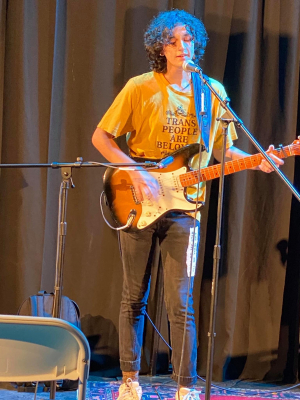Psychology Student Hones Critical Thinking Skills in Theater

Elliott Loverin, a junior majoring in Psychology with a minor in musical theater, is focused on the intersections of developmental, abnormal and social psychology. He’s also intrigued by the interactions between individual psychopathology and group dynamics, especially in young people.
“Gaining insight into the processes that govern human behavior inspired me to pursue psychology, and its diverse applications allow me to investigate the topics I find interesting within the field.”
Loverin’s theater career began with an audition for “A Christmas Carol” at the Berkshire Theatre Group in Pittsfield, Massachusetts. Although he wasn’t cast, the 10-year-old was invited to perform in the background chorus for the annual holiday concert.
“That experience opened the doors for me to continue auditioning, and I performed in summer community productions for six years,” he says.
Loverin later joined the youth theater program at the Barrington Stage in Barrington, Massachusetts, where he helped build the company’s world premiere production of “Hansel and Gretel.”
At Duke, he’s an ensemble member of the student group Hoof ‘n’ Horn, appearing in “Between the Lines” and “The Rocky Horror Picture Show,” as well as the Duke Players’ production “Heathers.”
This past summer, he continued work with Barrington Stage as a production assistant on another world premiere, “The SupaDupa Kid,” and found time to participate in Duke in New York.
And if that isn’t enough, audiences can see him this semester in Theater Studies’ spring mainstage “Rent.”
We asked Elliott what brought him to theater at Duke, why he makes space for the discipline in his course load and what the arts bring to his studies.
How did you know Theater Studies was right for you?
Originally, I applied to Duke as a Theater Studies and Physics double major and submitted an arts supplement with my application, which included a monologue, dance reel and two songs.
Once I arrived on campus, I went through a long period of soul- and major-searching — which is totally okay. During this time, I considered other majors in public policy, Statistics and Linguistics.
Throughout this process, I knew that I wanted theater to be part of my academic plan, and this was solidified when I auditioned for the mainstage production of “Life is a Dream” in the spring of 2021.
R. Darren Gobert, chair and William and Sue Gross Distinguished Professor of Theater Studies, was watching the audition. He told me he remembered me from my application arts supplement two years prior — and that’s when I knew I wanted to be part of the department.
Why is it important to include musical theater courses in your studies when your career path is focused on psychology?
Critical thinking is a major part of any discipline, and I believe there is nowhere better to hone critical thinking skills than in a theater course.
Theater teaches invaluable lessons that can benefit anyone, regardless of career plans. I’ve learned how to develop my own opinions on art and performance and to analyze why people make the choices they make in a creative setting — something that easily lends itself to my studies in psychology.
Theater is also about communication: acting is reacting. This skill is important anywhere but especially in psychology and while developing a career. Finally, the personal connections I’ve made are outstanding. I’ve met countless, lifelong friends and mentors through the department.
What are your plans after graduation?
I plan to become a drama therapist, working with at-risk youth to express themselves through theater. Drama is a healthy and creative medium that can help individuals develop communication skills and self-confidence, as well as express emotions. My knowledge of the history and methods of theater and performance studies will help me determine what will be most beneficial to my patients.
Using the knowledge and skills I’ve developed in the theater will help me to curate my clients’ experiences to their needs, whether that be performing scenes and songs from a show reflecting their own situations, learning to project their voices and take up space or using movement and dance as a therapeutic device.
I also plan to continue auditioning for theatrical productions — so keep an eye on your playbills!

